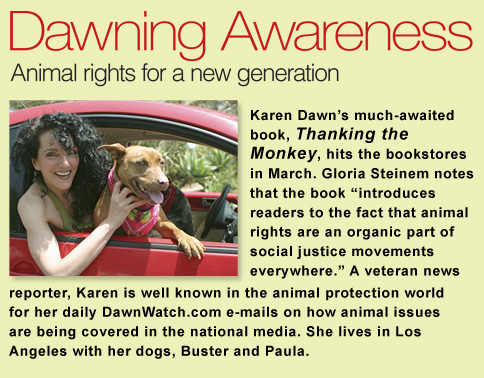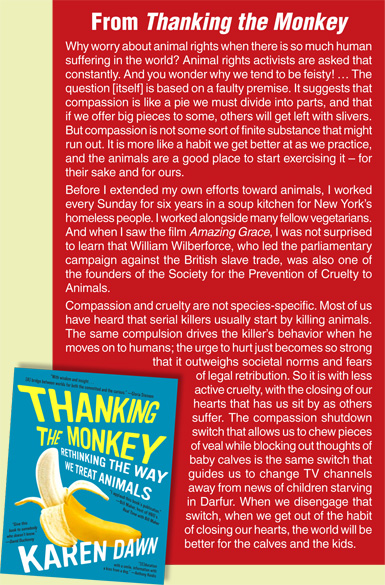|
|

| REVIEWS & WRITE-UPS |
|
K.D.: Yes. We still have a long, long way to go. Animals are still treated abysmally by society but it isn’t seen as a fringe issue anymore. People are starting to see it as a serious issue and something B.F.: A lot of people are horrified when they hear what goes on in puppy mills, where the animals are abused and crowded into small cages for their entire breeding lives and then killed. But exactly the same thing, and worse, happens to pigs and cows at factory farms. What’s going on here with us as human beings?
B.F.: So, how do we extend what Albert Einstein called our “circle of compassion”? K.D.: Well, our instincts might be telling us to care for those closest to us. But that doesn’t necessarily mean it’s ethically right. The truth is that other animals suffer just as much as dogs and cats, and we have to remind ourselves of that and think about what we want to support in our buying activities and our other actions. B.F.: You’ve been very successful in writing opinion pieces in newspapers and letters to the editor and so on. What difference does writing letters to the editor actually make? K.D.: It makes a huge difference. If you write to a small paper, you’re probably going to be published because a lot of the small papers publish close to 100 percent of the letters they receive. So if your letter makes any sense, you’ll probably get published, which means that people will read the letter. B.F.: So what are a couple of things that people should know about writing a letter to the editor? K.D.: Be brief, and be pleasant. And base your letter on something that’s going on in the news, and that you can use as a jumping-off point. For example, when Christmas rolls around, it’s a perfect time to write a letter in response to any story about Christmas and remind people that this is not just the time for brotherly love, but for love of all God’s creatures. Mention that readers might want to share that love by adopting an animal or by choosing vegetarian dishes on their holiday dinner plates. Anything about the environment is a perfect jumping-off point for a letter talking about what factory farming does to our environment and its effect on global warming. (Cows, not cars, are actually the greatest source of carbon dioxide emissions on the whole planet.) So anybody who reads the letters section, which is a widely read section, is going to learn a little bit about the issue, which makes it part of the public conversation. Silence is the worst thing that can happen to the animals. B.F.: A big animal story in the news has been the Michael Vick case about dog fighting. Paradoxically, he may have done more for the cause of stopping dog fighting than the entire humane movement could have done in years! K.D.: Well, that’s why I say “God bless Michael Vick.” (And you know what I mean by that!) Of course, it’s all about our cult of celebrity. Which is why my book is celebrity- B.F.: What do you hope to see happen in the next few years? K.D.: If the next generation of parents – the ones who will be reading my book – are raising their kids to be vegetarians, the impact on the whole world will be extraordinary. Some of the greatest philosophers have said things like we can’t expect war to end while we’re still killing animals. It’s all connected. B.F.: Yes, people get very upset by that. K.D.: So, a big part of animal advocacy is that we have to get people to open up their hearts to animals. And while of course that makes all the difference for the animals, it also affects the way people are and it affects their hearts. There’s a beautiful line that Rick O’Barry, the dolphin expert, has. He says we teach the child not to hurt the butterfly as much for the child as for the butterfly. So we need to raise our kids to have an awareness of animals, which probably involves not killing them if we don’t need to. And these days we don’t need to. You can sign up for Karen Dawn’s free e-mail reports and learn about involving the media in helping animals by going to her website at DawnWatch.com. Back to Reviews & Write-Ups |

 Best Friends: There are lots of books about animal protection and animal rights. And you get into some fairly heavy stuff in parts of the book. But it’s full of cartoons and celebrity quotes and big photos. Who are you trying to reach?
Best Friends: There are lots of books about animal protection and animal rights. And you get into some fairly heavy stuff in parts of the book. But it’s full of cartoons and celebrity quotes and big photos. Who are you trying to reach? K.D.: When the World Trade Center went down, Americans were just completely shaken. We knew the building, and there were even some people we knew or knew of, and it was terrible. But then there can be a massive bombing or an earthquake on the other side of the world with people we don’t know or don’t feel so close to, and it might not even make the evening news. I think we’re just wired to care more about those closest to us. It’s the same with dogs and cats. We live with them, so we’re closer to them. It’s not that they’re more sentient than other species, any more than an American is more sentient than someone in Thailand or Iraq. We just care most about those whom we are closest to.
K.D.: When the World Trade Center went down, Americans were just completely shaken. We knew the building, and there were even some people we knew or knew of, and it was terrible. But then there can be a massive bombing or an earthquake on the other side of the world with people we don’t know or don’t feel so close to, and it might not even make the evening news. I think we’re just wired to care more about those closest to us. It’s the same with dogs and cats. We live with them, so we’re closer to them. It’s not that they’re more sentient than other species, any more than an American is more sentient than someone in Thailand or Iraq. We just care most about those whom we are closest to.